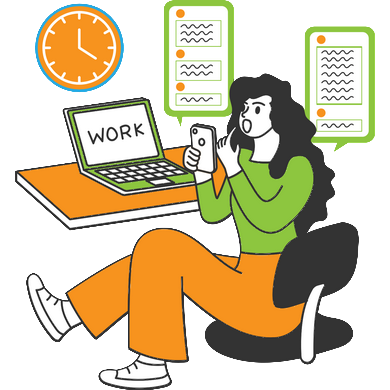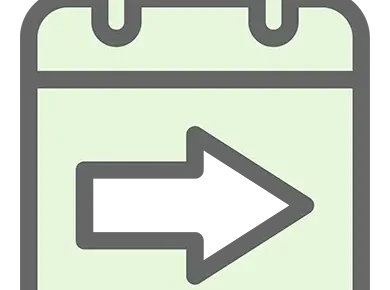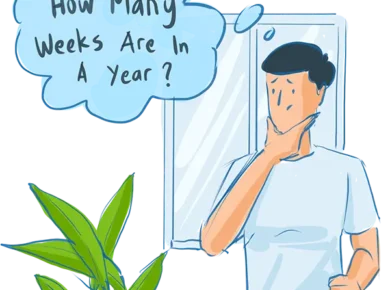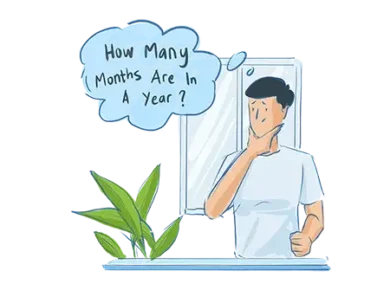Wasting time while working is something that happens to all of us. Maybe to some people more and to others less, but it happens to all of us. And then we have remorse and regrets, especially since we will have to work harder to be able to meet the deadlines.
Why wasting time makes us feel guilty?
Because we are aware that we can never make up for the lost time. Yes, we can manage to complete the work and meet the deadlines, but this does not mean that we have recovered the wasted time. It just means that I did certain activities in another time frame in which we should have dealt with something else.
Under no circumstances, the passage of time can be stopped or controlled. But, of paramount importance is the fact that we have control over how we spend our time. What we do with the time we have available is entirely our choice.
Wasting time while working, how does this happen?
Out of an average of 8 hours worked daily, 21% is spent on entertainment, news, and social media. That means almost 1 quarter, that is, almost 2 hours.And if we go into more detail, we will discover that during the time we set out to work, we wasting time on:
- communication and scheduling 1 hour
- social media 18 minutes
- news sites 12 minutes
- entertainment 30 minutes
Nowadays jobs almost always include sources of distractions. From the email that is often checked at much shorter intervals than necessary to instant messaging or phone calls unrelated and with no importance to our work, all of these produce interruptions that take us out of rhythm and make us wasting time.
Not to mention that in itself transitioning from one task to another takes time.
What can we do to avoid wasting time while working?
To take the right measures, we must first identify the factors that cause wasting time while we want to work. This is simple and easy to do with a time-tracking solution. We time all our activities and based on the reports we analyze how we spend our time during working hours. We discover flaws and promptly take the appropriate measures that can help us stop wasting time in the future.
One of the most viable solutions to avoid wasting time is to plan everything we want to do. If we do not want to eliminate the emails, social media, or the news during working hours, then it is advisable to find the right time for each one of those.
By planning them in our schedule we will be able to be up to date with everything we want and at the same time to keep an increased rate of productivity. In this case, it is very helpful to make a To-do list in which to reserve time chunks for everything we are interested in doing, including phone calls or social media.
For example, checking emails is usually necessary at the beginning of the day. In this case, we will set a certain time interval to check the emails and we will respect it. If the email is not the main way in which we carry out our professional communication, then it will be enough to check the emails once more at the end of the working day. But, if it is necessary, then we can set some other time intervals to check the email during the day, but carefully, to not let it become a wasting time operation.
For social media, social phone calls, or news we can use the breaks we have planned during the working day. But even in this case, we will have to respect the planning and not to exceed the time intervals allocated to the breaks or it will turn into wasting time.
How planning helps us to stop wasting time
Once we have set the to-do list and time intervals for both work and breaks, we will be able to focus better on what we have to do. During the period when we planned to work, we will no longer be tempted to think about “what’s new on social media?” or “what other news have appeared?”. We know very well that we have a certain amount of time allotted just for that and this is comforting. This will help us avoid wasting time through repeated interruptions.
When the planned time comes, we’ll deal with those things, but until then we’ll work in a much more productive way.
An important detail that we must take into account when planning the time intervals for activities is the time required to move from one task to another. Even if that means going back from one phone call to continuing the project in progress, it takes a few minutes to return to the maximum focus. Therefore, it is advisable not to divide the time into too small chunks, and to focus on one task at a time.
Note that wasting time does not include the same activities for everyone. While for an IT programmer checking instant messages on social media can be a way of wasting time, for someone who deals with online marketing it can be his main activity. Therefore, it is up to each of us to identify these activities and plan them correctly so that they are no longer wasting time.
Wasting time VS relaxing
Let’s be careful not to confuse wasting time with relaxing. Proper relaxation will positively influence our productivity. Therefore it is necessary to include those in our planning and, especially, not to feel guilty for doing that. When we are relaxed and in a good mood then we can concentrate better at work. With proper planning, we can do everything we set out to do and we also should feel good while doing so.
Relaxing doesn’t mean wasting time, it means “charging your batteries” for better productivity.
Note that engaging with social media or news channels may seem relaxing, but don’t allow our minds to settle because they tend to overstimulate our brain. The following activities are much more effective for relaxation: running or practicing a sport, yoga, playing an instrument, or any other artistic activity like painting, reading, or writing.






